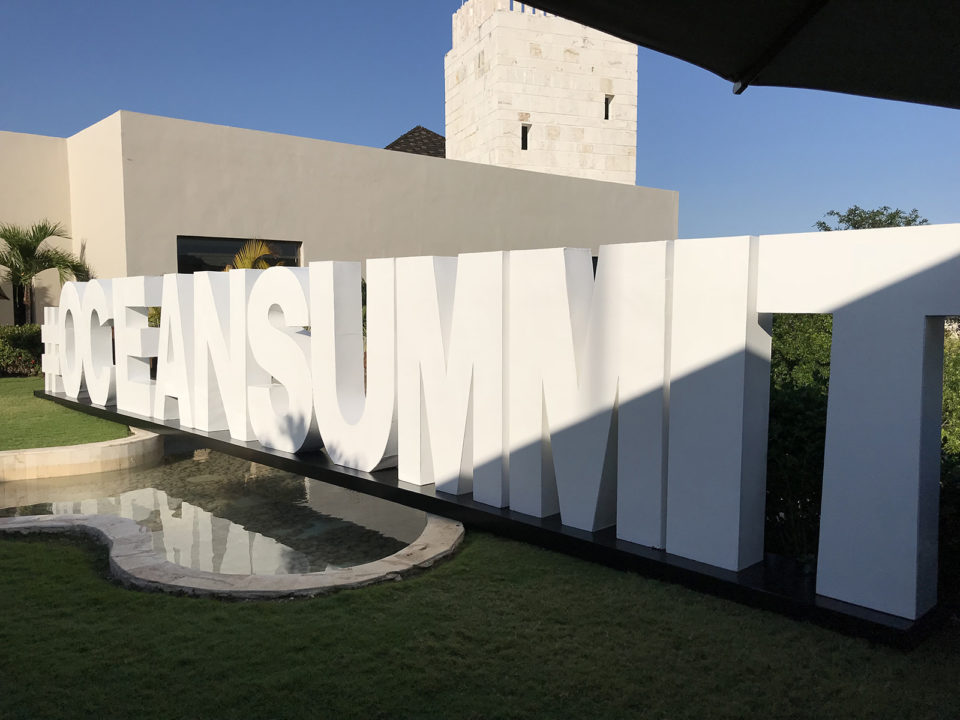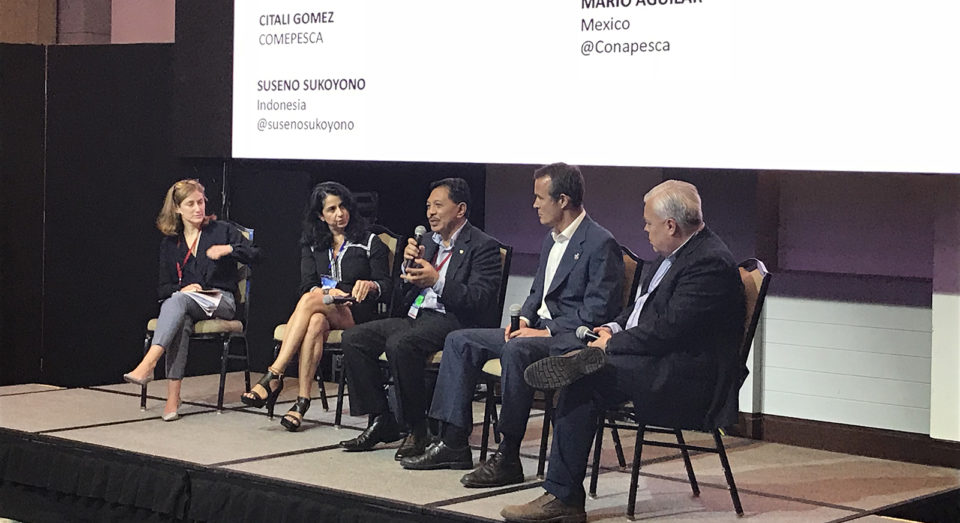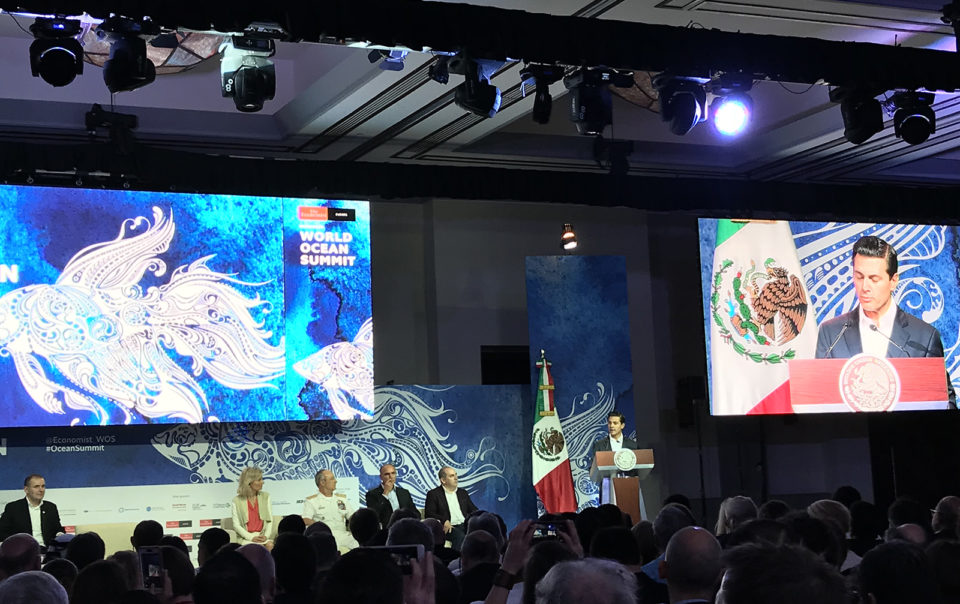Hosts of annual event produced by The Economist pose salient question and a challenge

Perhaps the most important question asked at the recent World Ocean Summit in Mexico came during the second day, from one of the event’s hosts.
“What are the oceans?” asked Mario Aguilar, director of Conapesca, Mexico’s national commission of aquaculture and fisheries. “Aquariums? Or the next frontier for development?”
As expected, talk of preservation, conservation, collaboration and responsibility dominated the hallways of the luxurious Fairmont Mayakoba resort in Playa del Carmen, Mexico, where the annual conference’s fifth iteration was held earlier this month. Aguilar’s blunt query reminded all that the oceans indeed need protection, but they also must be sustainably exploited for the benefit of humankind.
During a panel discussion on selling sustainable seafood, Aguilar pointed out that only 20 percent of global animal protein comes from seafood, despite the fact oceans comprise more than 70 percent of the planet’s surface. The sustainability of fisheries and aquaculture, he argued, required more attention than it gets.
“Sustainability means supply. Everyone should embrace it,” said Aguilar.

The business case for certification remains strong
Providing sustainability assurances through certification, however, is a cost that many small-scale producers simply can’t afford. But without it, their products and processes are often overlooked.
“Sustainability was in fashion but now it’s a need,” said Citlali Gomez, owner of rainbow trout farm in central Mexico and president of the board for COMEPESCA, Mexico’s seafood promotion council. “People are asking for it. In aquaculture, it’s very important to all get into the same row.”
While certification makes good business sense, Gomez said, it’s a challenge to communicate the need to small facilities and even consumers. People in developing countries, she noted, often are not looking for certification – they’re simply looking for food.
Rupert Howes, CEO of the Marine Stewardship Council, remarked that the slow burn of sustainability awareness and eco-labels like the MSC’s is indeed paying off. Howes said that the London-based organization recently conducted 16,000 consumers interviews that showed they “care deeply” about the oceans but don’t know who or what to trust.
“They would prefer sustainable seafood if they could identify it,” he said. “Most don’t trust government, but they do trust NGOs and scientists.”
Howes added that a growing number of responses from consumers in Asia and Africa reinforced the idea that certification is making a difference.
“It’s about sustainable management and utilization of our ocean resources to provide protein and feed people,” he said.

President Peña Nieto delivers inspiring words
Enrique Peña Nieto, president of Mexico, delivered an address to a packed room and declared Mexico all-in on aquaculture and sustainable seafood production. More than 130,000 hectares in Mexico are dedicated to aquaculture, a number that is growing. Aquaculture production has increased 16 percent in the past five years in Mexico, and about one-quarter of all fisheries and aquaculture production is covered by a sustainability certificate, he added.
“[Sustainability] is the greatest challenge that humankind is facing today,” said Peña Nieto, through an interpreter. “The protection of our seas and oceans and their sustainable use is part of this great effort. We are not just protecting the heritage of our country but the entire world. [We must] maintain the balance of economic growth, food security and the conservation of marine ecosystems.”
Peña Nieto encouraged all to be “audacious, bold, committed and determined” to overcome short-term interests and involve all stakeholders in sustainable ocean development.
“This is a struggle, this is a fight,” he said. “The oceans and seas are an invaluable source of food and wealth. The task is incumbent to all of us.”
Seafood’s investment ‘conundrum’ not due to lack of money
Cornell University Professor John Tobin-de la Puente, during a panel session titled “The Investment Conundrum,” voiced what many ocean stakeholders think when the subject of putting real money into ocean-related projects comes up.
“I worry about investors reacting to the first dozen or so transactions, saying they’re not particularly profitable, the legal fees are high, the time to closing was exceedingly long, this isn’t working … we need realistic expectations,” he said. “Let’s not expect that they’ll flourish and be highly profitable from the get-go. Social impact bonds, we need to give them a little more time.”
Darian McBain, global director of sustainable development for Thai Union, one of the world’s largest seafood companies, said a holistic perspective is necessary to gauge success in investment in sustainability.
“It has to pay for Thai Union. If there aren’t fish in the sea, we can’t be the largest producer of canned tuna in the world. For Thai Union, it’s an investment in the future, and it’s a long, slow process” in which the company’s partners, its regulators, its competitors and other stakeholders all agree on the controls. “Sustainability isn’t about the now.”
If there aren’t fish to fish, you can’t be a successful company. And aquaculture is still linked to wild-caught fisheries through feed. You can’t turn your back on sustainable fishing now and expect to be a growing company.
McBain added that education is key for even small gains. For example, if coastal mangrove forests are to be preserved, an investment must be made in order to educate small-scale fishermen and aquaculture producers about their importance.
“Without them understanding that if they overfish or clear the mangroves, we can’t begin to make that change,” she said, urging patience even in the face of shareholder pressure. “If there aren’t fish to fish, you can’t be a successful company. And aquaculture is still linked to wild-caught fisheries through feed. You can’t turn your back on sustainable fishing now and expect to be a growing company.”
Francisco Saraiva Gomes, CEO of Pontos Aqua Holdings, said that for seafood businesses to be investable, they must be sustainable. Or they simply won’t be in business, he said.
“[Now is] a fantastic opportunity to realize capital in seafood. It’s a field where there should be more excitement. It’s so complex, though, that if you surround yourself with people who know what they’re talking about, you’ll have an advantage. It’s not luck,” he said.
Gomes added that it’s not a lack of capital that holds investors back from seafood ventures, which are typically full of risk.
“It’s a lack of good opportunities; businesses that generate cash,” he said. “The industry is plagued by unmet expectations.”
Aquaculture impresses on the main stage
While most of the talk concerning fisheries, aquaculture and sustainable seafood was relegated to smaller conference rooms, Geir Molvik, CEO of Cermaq, had 15 minutes on the main stage and made the most of his appearance, wowing the crowd with a video of the company’s high-tech iFarm concept for “individualized” farmed salmon.
Despite the use of computer sensors that can identify individual fish for targeted health services based on the dot patterns on their skin, Molvik reminded the audience that salmon farming is still a relatively new industry, having been established in the 1970s in Norway. Today, the global farmed salmon industry produces 30 million salmon meals daily.
“We must protect the ocean. But at the same time, we have to use the ocean for more food production and we need knowledge and technology to produce in a responsible way. Salmon farming has invested a lot in research and innovation and this has made the industry highly profitable,” he said.
I believe we need more aquaculture to produce enough healthy food and I know the tech development in salmon farming can be transferred to other species and other countries, including the developing world.
Salmon aquaculture’s potential will be truly measured by the obstacles it can overcome, he added. Marine-based omega-3 fatty acids, an essential nutrient for humans and for salmon, is a limiting factor for growth that only innovation with alternative feed ingredients can solve.
“Yeast, algae, plants … the first to succeed to produce long-chain omega-3s, like those in marine oils, from global sources at a competitive cost, will make history,” he said. “And of course, a lot of money.”
Technology gains made by the salmon industry can help lift the aquaculture sector as a whole, he promised: “I believe we need more aquaculture to produce enough healthy food and I know the tech development in salmon farming can be transferred to other species and other countries, including the developing world.”
Climate change having a major impact
Ove Hoegh-Guldberg, director of the Global Change Institute at the University of Queensland, shared some rather grim facts and figures regarding the impacts of climate change on the oceans, during a plenary presentation on Day 1 titled “Spotlight on Science.” Hoegh-Guldberg was lead author for the “Oceans” chapter for the Fifth Assessment Report of the United Nations Intergovernmental Panel on Climate Change.
“Climate change is fundamentally reorganizing the ocean,” he said, in terms of increased temperatures, ocean acidification, changing currents, bigger storms, rapid sea lever rise, declining oxygen and escalating dead zones. “We are seeing major changes in the way the ocean operates.”
Hoegh-Guldberg explained that ocean organisms and ecosystems are “unraveling” from rapid changes, as fisheries decline, species go extinct, coastal threats accelerate and ocean productivity overall decreases. And humans are not immune, for the oceans are the primary food source for 3 billion people.
“It’s depressing and it’s worrying and we need to do something about it,” he said, urging that attendees help to find a “pathway” that will make the issue the substance of an emergency for global policymakers. “The species we belong to always leaves it to the last thrilling moment.”
Follow the Advocate on Twitter @GAA_Advocate
Author
-

James Wright
Editorial Manager
Global Aquaculture Alliance
Portsmouth, NH, USA
Tagged With
Related Posts

Intelligence
A motive, and a market, for farmed fish in Mexico
Boasting ample areas for aquaculture and a robust domestic demand for seafood – not to mention its close proximity to the U.S. market – a land of opportunity lies in Mexico. Fish farming is primed to meet its potential south of the border.

Responsibility
The promise of In-Pond Raceway Systems, part 1
A promising strategy to increase fish production in static aquaculture ponds, the In-Pond Raceway System (IPRS) grows fish confined at high densities in floating or fixed raceways, instead of the animals being free in the pond.

Responsibility
Aquaculture gives endangered totoaba a fighting chance
The tenuous fate of a pint-sized porpoise, the critically endangered vaquita, is linked to a fish targeted by poachers fueling China’s appetite for maws. The vaquita remains in peril, but aquaculture presents some hope for the totoaba.

Responsibility
GSSI furthers its mission of clarity out of confusion
The Global Sustainable Seafood Initiative aims to set the bar for certification schemes. Board members of the task force formed in 2012 convened at the SeaWeb Seafood Summit in Malta to reinforce the mission and brief attendees on progress.

